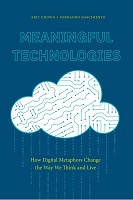Meaningful Technologies
How Digital Metaphors Change the Way We Think and Live
| dc.contributor.author | Chown, Eric | |
| dc.contributor.author | Nascimento, Fernando | |
| dc.date.accessioned | 2023-02-20T10:59:40Z | |
| dc.date.available | 2023-02-20T10:59:40Z | |
| dc.date.issued | 2022 | |
| dc.identifier | OCN: 1354571067 | |
| dc.identifier.uri | https://library.oapen.org/handle/20.500.12657/61383 | |
| dc.description.abstract | As smartphones mediate more of our activities, they are changing our relationship with meaning. To a teenager, for example a “conversation” is just as likely to refer to an exchange of text messages as it is a face-to-face discussion. Meanwhile, Facebook has redefined what friendship means, Snapchat what a memory means, etc. The kinds of changes smartphones bring are happening at rapid pace: TikTok reached a billion users in just over three years, whereas it took the telephone 75 years to reach a tenth of that number of people. Meaningful Technologies: How Digital Metaphors Change the Way We Think and Live by Eric Chown and Fernando Nascimento offers systematic reconsideration of the ways in which digital technologies impact our lives both individually and collectively. Metaphors aren’t just a clever way to describe technology, they are also changing the way we think. When we click on a picture of a shopping cart it connects a complex set of technologies to represent a simple idea that we’re all familiar with. A heart icon under a photo is understood as an easy way to express appreciation. We aren’t required to understand how technology works, just how we interact with it. The ambiguity of metaphors, and the complexity of technology can also hide important realities about what is being described. “The cloud,” for example, actually consists of very real data centers, which consume huge amounts of natural resources to keep running. Meanwhile, pressing that heart icon on a photo is a signal to the artificial intelligences running in your app that you want to see more things like that photo and that it should adjust what it knows about you accordingly. There is a constant feedback loop between us and the digital technologies we use. We are constantly using them and they are changing us through their usage. Meaningful Technologies focuses on this loop from the perspectives of hermeneutic philosophy and cognitive science. Through the former, the authors examine meaning and how it changes over time. Through the latter, they gain understanding of how this feedback loop impacts individuals, especially in terms of learning and attention. Chown and Nascimento argue that, on the one hand, apps have a kind of agency never before possible in a technology, but also that, armed with a critical framework for examining such apps, we can regain some of our own agency. This book will appeal to scholars of digital media digital and computational studies, and those interested in issues related to ethical impacts of digital technologies. | en_US |
| dc.language | English | en_US |
| dc.subject.classification | thema EDItEUR::P Mathematics and Science::PD Science: general issues | en_US |
| dc.subject.classification | thema EDItEUR::P Mathematics and Science::PD Science: general issues::PDA Philosophy of science | en_US |
| dc.subject.classification | thema EDItEUR::J Society and Social Sciences::JM Psychology::JMR Cognition and cognitive psychology | en_US |
| dc.subject.other | Metaphors, Technology, Meaning, Cognitive Science, Hermeneutics, Digital Media, Media Studies, Smartphones, Philosophy, Mobile Applications, Apps, Social Media, Innovation, The Cloud, Ethics, Digital, Humanities | en_US |
| dc.title | Meaningful Technologies | en_US |
| dc.title.alternative | How Digital Metaphors Change the Way We Think and Live | en_US |
| dc.type | book | |
| oapen.identifier.doi | 10.3998/mpub.12668201 | en_US |
| oapen.relation.isPublishedBy | ef2222a7-42fd-4619-af89-7b20915b4b05 | en_US |
| oapen.relation.isbn | 9781643150413 | en_US |
| oapen.pages | 275 | en_US |
| oapen.remark.public | Funder name: Lever Press |


